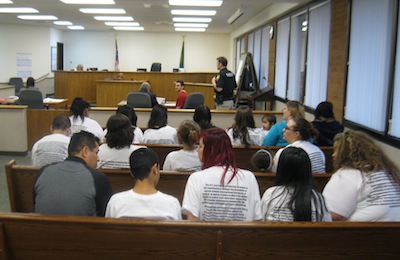By Sharyn L. Decker
Lewis County Sirens news reporter
CHEHALIS – Lewis County Superior Court Judge Nelson Hunt found no merit in any of the arguments that he should reduce the nearly 93 year sentence he imposed on a former Centralia High School student convicted of a 2007 drive-by shooting in which nobody was killed.
Guadalupe Solis-Diaz Jr. was 16 years old when gunfire was sprayed along the east side of South Tower Avenue in Centralia, missing six bar patrons. Witnesses testified it was gang-related. Solis-Diaz maintained he was innocent.
“The sentence is precisely what the legislature intended,” Hunt said.
Solis-Diaz was back in court this morning, because the state Court of Appeals ordered the local court to conduct a new hearing, referencing various matters that should have been handled more thoroughly, given that he was a juvenile. The challenge was made in light of a constitutional ban on cruel and unusual punishment, specifically a 2010 U.S. Supreme Court decision that held a sentence of life without parole is forbidden for a juvenile who did not commit homicide.
Hunt listened to both attorneys, a juvenile psychologist and even the defendant before making his pronouncement.
“The sentence will remain unchanged, 1,111 months,” Hunt said.
The judge criticized the appeals court decision calling some of their conclusions insulting and ludicrous. He defended the original court-appointed attorney, whom the appeals judges said made a number of choices at sentencing that no reasonable attorney would have.
None of the mitigating factors raised by Solis-Diaz’s current lawyer are legally sufficient, Hunt said.
About 40 individuals looked on, many wearing T-Shirts in support of the convict, including Solis-Diaz’s mother.
“I’m not here to beg for mercy for Mr. Solis-Diaz,” defense attorney Robert Quillian told the judge. “He did what he did.”
But this is no homicide case, he said.
Quillian pointed out documents provided to the judge before this morning’s court session in which he offered a number of grounds for an exceptional sentence downward.
He asked the judge to re-sentence his client to 15 years.
Lewis County Senior Deputy Prosecutor Sara Beigh recommended the same sentence Solis-Diaz got the first time.
Soliz-Diaz was tried as an adult at the end of 2007 and convicted of multiple offenses, including one count of first-degree assault for each bullet that was fired.
The six assault counts were ordered to be served consecutively and each carried a mandatory extra five years because they were committed with a firearm. The sentence given was at the high end of the standard range.
Solis-Diaz, now 23, has been residing in the Lewis County Jail for more than a year, awaiting today’s hearing.
He took the judge up on his offer to speak today, saying he’s not perfect and never has been, and pointed out some of the educational accomplishments he’s made since being locked up.
“Let me show you I can be rehabilitated,” he said.
The red jail garb clad young man told the judge he prays every night, thanking God nobody got hurt. And he thanked the judge for having incarcerated him
“If I wasn’t locked up, I’d have been dead years ago,” he said.
Hunt included in his remarks that the changes in sentencing made by the state legislature were specifically to move away from rehabilitation and give more weight to accountability.
The legislative intent was expressively to curb gun violence among youth, Hunt said.
“The legislative intent is clear,” he said. “Serious violent crimes will be punished severely and older teens will be treated as adults,” he said.
Hunt said he knew he could have given an exceptional sentence downward, and chose not to.
One of the purposes of sentencing is to send a message to others, he said. And it worked in Centralia, according to Hunt.
“From the day this sentence was pronounced, there have been no similar crimes,” he said.
Quillian filed a notice of appeal.
Beigh noted she was scheduling a review hearing in 15 years, on March 5, 2029, in light of potential changes in state law.
The legislature is looking at allowing offenders who committed their crimes when under age 18 to petition the indeterminate sentencing board for release after 20 years, Beigh said.




 Join us
Join us